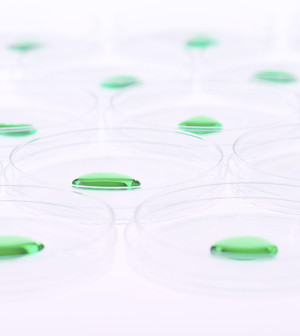- Recognizing the Signs of Hypothyroidism
- 10 Strategies to Overcome Insomnia
- Could Artificial Sweeteners Be Aging the Brain Faster?
- Techniques for Soothing Your Nervous System
- Does the Water in Your House Smell Funny? Here’s Why
- Can a Daily Dose of Apple Cider Vinegar Actually Aid Weight Loss?
- 6 Health Beverages That Can Actually Spike Your Blood Sugar
- Treatment Options for Social Anxiety Disorder
- Understanding the Connection Between Anxiety and Depression
- How Daily Prunes Can Influence Cholesterol and Inflammation
Nutritional Supplement May Benefit Parkinson’s Patients


A common nutritional supplement called inosine safely boosts levels of an antioxidant thought to help people with Parkinson’s disease, a small new study says.
Inosine is a forerunner of the antioxidant known as urate. Inosine is naturally converted by the body into urate, but urate taken by mouth breaks down in the digestive system.
“Higher urate levels are associated with a lower risk of developing Parkinson’s disease, and in Parkinson’s patients, may confer a slower rate of disease worsening,” explained Dr. Andrew Feigin, a neurologist at the Cushing Neuroscience Institute’s Movement Disorders Center in Manhasset, N.Y. He was not connected to the new study.
The study included 75 people who were newly diagnosed with Parkinson’s and had low levels of urate. Those who received doses of inosine meant to boost urate levels showed a rise in levels of the antioxidant without suffering serious side effects, according to the study published Dec. 23 in the journal JAMA Neurology.
“This study provided clear evidence that, in people with early Parkinson disease, inosine treatment can safely elevate urate levels in the blood and cerebrospinal fluid for months or years,” study principal investigator Dr. Michael Schwarzschild, a neurologist at Massachusetts General Hospital, said in a hospital news release.
“We know that urate has neuroprotective properties in animal models,” Schwarzchild added. Several human trials had also hinted that it might help Parkinson’s patients, he said, “so the positive results of this trial are very encouraging.”
The findings support further research into urate’s ability to slow the progression of Parkinson’s, and Schwarzschild and his team are designing a larger phase 3 clinical trial.
However, despite the positive results so far, Parkinson’s patients and their caregivers should not attempt inosine treatment at this time, said Schwarzschild, who is also a professor of neurology at Harvard Medical School.
“While there is considerable evidence to support this therapy’s potential, inosine is still an unproven treatment for Parkinson disease,” he said “We know that excessively high urate can lead to kidney stones, gout and possibly other untoward effects, which is why attempts to elevate urate are best pursued in carefully designed clinical trials where the risks can be reduced and balanced against possible benefits.”
One other expert agreed that more study is needed.
“As a phase 2 study, this protocol was not designed to demonstrate whether or not treatment with inosine delayed need for symptomatic therapy for Parkinson’s disease,” said Dr. Steven Frucht, a professor of neurology and director of the movement disorders division at Mount Sinai School of Medicine, in New York City. “A phase 3 trial will be needed to demonstrate whether or not oral inosine [helps fight Parkinson’s], or even has the potential to delay the need for symptomatic treatment.”
More information
The U.S. National Institute of Neurological Disorders and Stroke has more about Parkinson’s disease.
Source: HealthDay
Copyright © 2026 HealthDay. All rights reserved.










